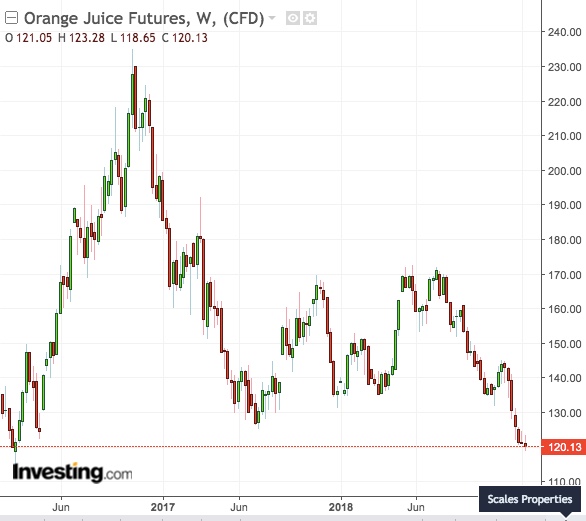It’s not called The Sunshine State without reason. But orange juice traders are still hoping there’ll be some freeze in Florida soon to tamp down a bounty crop that has crushed prices of the citrus product to near three-year lows.
Frozen concentrated orange juice (FCOJ) futures tend to be highly sensitive to weather conditions in Florida. Winter often brings crop freezes and significant rallies to the market. Yet, that hasn’t happened this time.
Jack Scoville, softs analyst at The Price Futures Group brokerage in Chicago, explains the current phenomenon in Florida’s orange groves:
“The weather is warm and mostly dry. Production is abundant, with producers seeing small to good-sized fruit.”
In its last crop report issued before the December 22 government shutdown, the U.S. Department of Agriculture forecast orange production for the current season at 77 million boxes, or 3.47 million tons. That’s 70 percent more than in 2017, when many of the state’s fruit trees were destroyed by Hurricane Irma.
Outsize Orange Crop Weighing On FCOJ Futures
Such bountiful production might be good news for citrus farmers in Florida, who aim to sell as many boxes as possible to juice processors each year. But an outsize crop is not helpful to FCOJ contracts, which trade up and down on production data out of Florida.

FCOJ futures lost 13 percent of their value in December alone, ending 2018 with an 8 percent drop. That was still an improvement over 2017, when prices fell 31 percent despite the crop destruction from Hurricane Irma that supported prices for several months.
The dawn of 2019 hasn’t brought much hope for juice traders looking for higher prices.
The warm Florida weather has continued to punish traders with long positions in FCOJ, driving the key March futures contract on New York’s ICE Futures exchange to a 34-month low of $1.1865 per lb earlier this week.
Price Trends Turning Lower
Said Scoville of Price Futures Group:
“Trends are still turning down on the daily charts and remain down on the weekly charts.”
So far into 2019, most of the 33 commodity futures traded either in New York or London and tracked by Investing.com (desktop users click here and go to “performance” to see list), are up. Some energy commodities, like oil and natural gas, have even posted double-digit gains. But FCOJ is seeing one of the worst returns, with a loss of more than 4 percent within the first two weeks. Investing.com’s daily technical outlook also has a “Strong Sell” call on FCOJ.
Proprietary commodities trader Andrew Hetch, who has some 30 years of experience in the futures markets, said:
“FCOJ is a thin and illiquid market that is dangerous as it is susceptible to price gaps when the price is moving. I would not recommend it to anyone because of the lack of liquidity.”
Brazilian Competition Not Helping
And it’s not just the futures market that’s been getting poorer. Despite the higher production now in Florida, the physical juice market continues to be dominated by Brazilian producers, who became a major competitor to U.S. farmers in recent years by offering lower-priced and comparable-quality supply to brands like Pepsi's (PS:PIP) Tropicana and Coca-Cola's (NYSE:KO) Simply Orange.
Shawn Hackett of agricultural markets consultancy Hackett Financial Advisors in Boca Raton, Florida, said he believed the higher orange output this winter was a blip and the price slump an “overshoot to the downside for no reason.” He added:
“Orange juice has taken a beating just as we are entering the critical period when a frost scare in the Florida citrus areas is becoming a much more probable event from late January/February. On top of this, a drought developing in Brazil needs to be watched closely for reducing what was supposed to be a large crop to be harvested in the late spring.”
